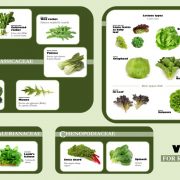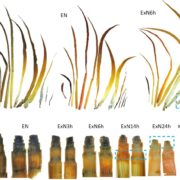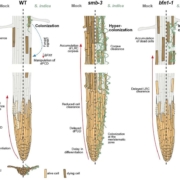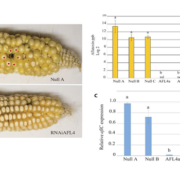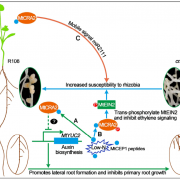A plant chitinase controls cortical infection thread progression and nitrogen-fixing symbiosis (eLIFE)
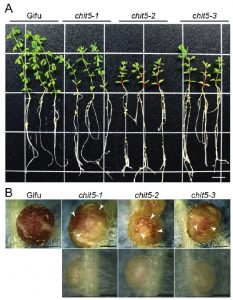 Nitrogen-fixing bacteria produce species-specific chitin-like molecules, Nod factors, which induce nodule development and infection thread formation in the host plant, aiding microbial infection. Malolepszy et al. performed a detailed study of symbiotic defective mutants in lotus (chit5), where the nodule primordia do not develop into nodules after inoculation with M.loti. CHIT5 was observed to function in infection thread development and branching within nodules, which is required for the establishment of fully functional nitrogen-fixing symbiosis. Chit5 was actively transcribed in all cells of uninoculated roots and early stages of infection and decreased within fully functional nodules. The secreted CHIT5 contributed to hydrolysis of a Nod factor R7A, but the hydrolysis was limited to fully compatible Nod-factors – ensuring symbiote-specific signaling. CHIT5 dependent modulation of Nod factor levels within nodules is critical for transition to full symbiosis with nitrogen-fixing bacteria. (Summary by Magdalena Julkowska) eLIFE 10.7554/eLife.38874
Nitrogen-fixing bacteria produce species-specific chitin-like molecules, Nod factors, which induce nodule development and infection thread formation in the host plant, aiding microbial infection. Malolepszy et al. performed a detailed study of symbiotic defective mutants in lotus (chit5), where the nodule primordia do not develop into nodules after inoculation with M.loti. CHIT5 was observed to function in infection thread development and branching within nodules, which is required for the establishment of fully functional nitrogen-fixing symbiosis. Chit5 was actively transcribed in all cells of uninoculated roots and early stages of infection and decreased within fully functional nodules. The secreted CHIT5 contributed to hydrolysis of a Nod factor R7A, but the hydrolysis was limited to fully compatible Nod-factors – ensuring symbiote-specific signaling. CHIT5 dependent modulation of Nod factor levels within nodules is critical for transition to full symbiosis with nitrogen-fixing bacteria. (Summary by Magdalena Julkowska) eLIFE 10.7554/eLife.38874


